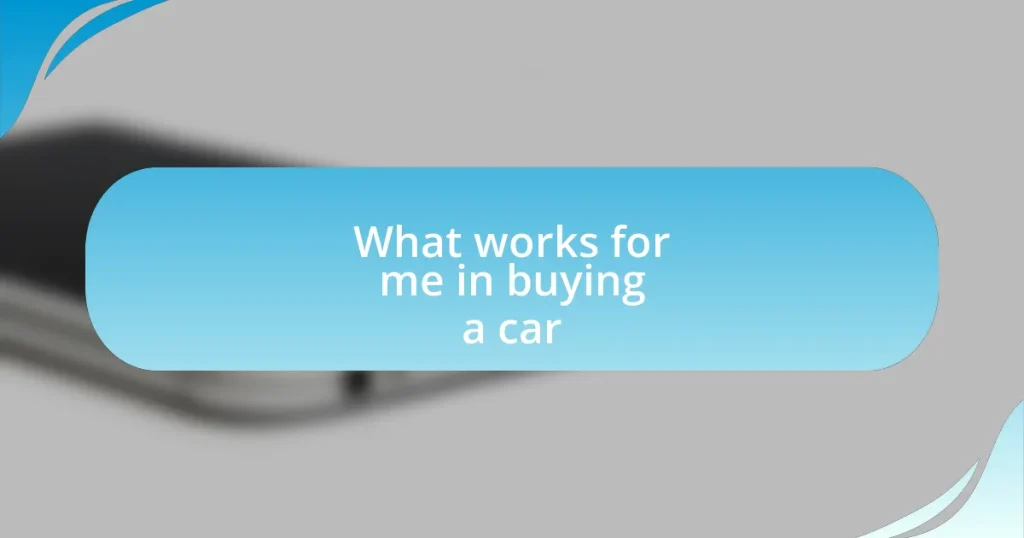Key takeaways:
- Understanding your insurance needs involves evaluating lifestyle, family size, and potential risks to identify appropriate coverage.
- Research different insurance types and their distinctions, such as health, auto, homeowners, and life insurance, to make informed decisions.
- When comparing providers, consider coverage quality and customer service ratings rather than just price to avoid inadequate coverage.
- Seek professional advice to navigate complex insurance choices and uncover potential gaps in your coverage.

Understand your insurance needs
When I first started looking into insurance, I found myself overwhelmed by all the options available. Honestly, it felt a bit like standing in the cereal aisle of a grocery store—so many choices, but none seemed tailored to my needs. Evaluating what you truly require is vital; consider factors like your lifestyle, family size, and financial stability to identify what coverage will best support your specific situation.
Understanding your insurance needs also involves reflecting on past experiences. I remember a friend who underestimated their health coverage and faced significant expenses when an unexpected medical issue arose. It was a tough lesson. This kind of scenario raises a crucial question: Are you prepared for the unexpected? Assessing potential risks in your life can guide you toward the right policy.
In my own experience, I learned the importance of not just focusing on premium costs but the value of comprehensive coverage. Recently, I re-evaluated my auto insurance and realized that while the low premiums were attractive, the level of coverage was inadequate for my daily commute. I began to ask myself, “What happens if I’m in an accident?” Ensuring that my policy aligns with my actual driving habits gave me peace of mind, something that’s priceless.

Research different insurance types
Researching different types of insurance can be surprisingly enlightening. Initially, I thought all insurance was pretty much the same, but as I delved deeper, I realized that various types serve distinct purposes. For example, when I explored life insurance options, I discovered policies like term life and whole life that cater to different financial goals. It’s essential to not just skim the surface but to dig into the details of each type. Learning what differentiates homeowner’s insurance from renter’s insurance, for instance, completely changed the way I viewed my coverage needs.
Here are some key types of insurance to consider:
- Health Insurance: Covers medical expenses and may include preventive services.
- Auto Insurance: Protects against damage to your vehicle and liability for accidents.
- Homeowners/Renter’s Insurance: Safeguards personal property and liabilities related to residence.
- Life Insurance: Provides financial security to beneficiaries upon the policyholder’s death.
- Disability Insurance: Offers income support if you can’t work due to illness or injury.
When I compared these options, it became clear that each type not only meets different needs but can also impact my finances in various ways. Understanding these distinctions can make all the difference in selecting a policy that truly fits your life.

Compare insurance providers effectively
When comparing insurance providers, it’s essential to look beyond just the price tag. In my experience, the cheapest option isn’t always the best. I remember choosing an auto insurance plan based solely on cost, only to find out later that the coverage limits were far too low for my needs. A little more upfront investment often leads to more robust coverage and fewer headaches down the line.
Customer service is another critical factor. I once went through a frustrating claim process with a provider that seemed indifferent to their clients. It taught me that dealing with unresponsive agents can leave you feeling helpless during difficult times. I recommend considering reviews and ratings on customer experience to ensure you choose a provider that prioritizes support and communication.
Lastly, it’s crucial to look at policy specifics, such as deductibles and exclusions. I once overlooked a policy’s fine print and was surprised to find out that certain damages weren’t covered when my property took a hit. Take the time to explore what each policy includes and what it omits, as this might affect your decision significantly.
| Insurance Provider | Annual Premium |
|---|---|
| Provider A | $1,200 |
| Provider B | $1,000 |
| Provider C | $1,500 |
| Key Features | Customer Service Rating |
| Provider A | 4.5/5 |
| Provider B | 3.5/5 |
| Provider C | 4.0/5 |

Evaluate policy coverage options
Evaluating policy coverage options is one of the most critical steps in the insurance selection process. I recall when I purchased health insurance; I focused on the premium without fully understanding the coverage limits for various treatments. It wasn’t until I sought a specialist that I found out some services weren’t covered at all. How disappointing that was! This experience reinforced my belief that understanding what your policy covers is paramount.
Take time to examine the scope of coverage carefully. I once compared two homeowners’ insurance policies; one had a higher premium but covered replacement costs for personal property, while the other didn’t. Choosing the right policy can make a huge difference in how protected you feel during a loss. Are you considering what it would be like to replace your possessions from scratch? That peace of mind can be worth every extra dollar spent.
Be aware of exclusions and limitations that can leave you vulnerable. I found myself unprotected against a particular natural disaster because it was explicitly excluded in my policy. I had assumed it would be covered due to my location, but that was a costly oversight. Ensuring clarity about these aspects helps prevent the frustrations I faced and allows you to make a more informed decision.

Look for discounts and benefits
When I was shopping for auto insurance, I learned the importance of looking for discounts and benefits. I stumbled upon a provider offering a loyalty discount for simply renewing my policy. It felt rewarding to see how staying with a company could save me money, and that little bit of savings prompted me to explore even more options.
Don’t underestimate the power of bundling policies. I remember switching my home and auto insurance to the same provider, which not only streamlined my payments but also slashed my overall premium. This experience made me realize that insurance companies often provide significant discounts for bundled services, so asking about these options can yield surprising financial relief.
Another aspect that many overlook is the opportunity for safe driver discounts. After taking a defensive driving course, I contacted my insurer and found out I qualified for a notable discount. It was a win-win situation; not only did I save money, but I gained extra confidence on the road. Have you checked if you can benefit from any courses or safe driving records? You might be amazed at the options available.

Read customer reviews and testimonials
Reading customer reviews and testimonials can be a game changer in the insurance selection process. When I was deciding on health insurance, I made it a point to read what others had to say about their experiences. Some reviews painted a picture of responsive customer service, while others highlighted delays and frustrating claims processes. It gave me a glimpse into what I might expect if I went with a particular provider. Have you ever felt conflicted over a choice? Customer stories can help clarify those gray areas.
I specifically remember a review that described how a family faced a challenging claim after a car accident. The way they shared their experience—how the insurer supported them versus how another company barely responded—really struck a chord with me. Those real-life accounts not only inform but also evoke emotions. It made me realize that insurance isn’t just about numbers; it’s about people’s lives, and the support they receive during tough times can make all the difference.
Trust but verify—it’s a mantra I keep in mind when reading testimonials. When I encountered a company with overwhelmingly positive reviews, I was initially skeptical. So, I dug deeper; I found some negative feedback that brought balance to the picture. A mixed bag of reviews often signifies a company that has strengths but also areas that might need attention; recognizing those nuances helped me make a more educated choice. Have you taken the time to explore both sides of the story? It can lead to a more informed decision that aligns with your needs.

Seek professional advice when necessary
When navigating the complex world of insurance, seeking professional advice can save you a lot of headaches. I recall a time when I was uncertain about the best coverage for my small business. Consulting an insurance broker, someone well-versed in the nuances of various policies, clarified my options and helped me avoid costly mistakes. Have you ever felt overwhelmed by choices? Trusting someone with expertise can make difficult decisions feel manageable.
I’ve also encountered situations where a friend needed to switch their auto insurance after an accident. Initially, they struggled to understand the implications of their coverage options. By reaching out to a professional, not only did they clarify their needs, but they also found a policy that better suited their situation. It reminded me how valuable having an expert in our corner can be. Have you considered how a professional can tailor advice specifically to your unique circumstances?
Professional advice isn’t just beneficial for those new to insurance; it can also provide a fresh perspective for seasoned policyholders. I remember revisiting my home insurance policy after a few years and feeling unsure if I had the best coverage. Speaking with an agent helped uncover gaps I hadn’t noticed—insights only a knowledgeable individual could provide. This experience reinforced for me just how proactive we should be when it comes to our insurance choices. When was the last time you spoke to a professional about your coverage? It might be time for a check-in.














